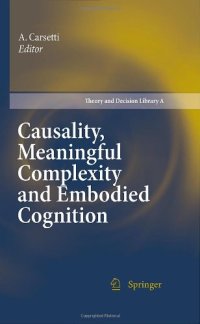
Ebook: Causality, Meaningful Complexity and Embodied Cognition
- Genre: Mathematics // Applied Mathematicsematics
- Tags: Epistemology, Statistical Physics Dynamical Systems and Complexity, Simulation and Modeling, Philosophy of Mind
- Series: Theory and Decision Library A: 46
- Year: 2010
- Publisher: Springer Netherlands
- Edition: 1
- Language: English
- pdf
Arturo Carsetti According to molecular Biology, true invariance (life) can exist only within the framework of ongoing autonomous morphogenesis and vice versa. With respect to this secret dialectics, life and cognition appear as indissolubly interlinked. In this sense, for instance, the inner articulation of conceptual spaces appears to be linked to an inner functional development based on a continuous activity of selection and “anchorage” realised on semantic grounds. It is the work of “invention” and g- eration (in invariance), linked with the “rooting” of meaning, which determines the evolution, the leaps and punctuated equilibria, the conditions related to the unfo- ing of new modalities of invariance, an invariance which is never simple repetition and which springs on each occasion through deep-level processes of renewal and recovery. The selection perpetrated by meaning reveals its autonomy aboveall in its underpinning, in an objective way, the ongoing choice of these new modalities. As such it is not, then, concerned only with the game of “possibles”, offering itself as a simple channel for pure chance, but with providing a channel for the articulation of the “ le” in the humus of a semantic (and embodied) net in order to prepare the necessary conditionsfor a continuousrenewal and recoveryof original creativity. In effect, it is this autonomy in inventing new possible modules of incompressibility whichdeterminestheactualemergenceofnew(andtrue)creativity,whichalsotakes place through the “narration” of the effected construction.
With respect to the possible outlining of new models of the process of knowledge construction, we are really faced, at the moment, with the appearance of a new frontier: a frontier that appears strictly linked to the emergence of a conceptual revolution at the level of the analysis of that peculiar entanglement of complexity, information, causality, meaning, emergence, teleology and intentionality that characterizes the unfolding of the "natural forms" of human cognition. To recognize some of the peculiar knots of this particular conceptual revolution precisely constitutes the first target of the volume. Cognitive activity is rooted in Reality, but at the same time represents the necessary means whereby Reality can embody itself in an objective way: i.e., in accordance with an in-depth nesting process and a surface unfolding of operational meaning. In this sense, the objectivity of Reality is also proportionate to the autonomy reached by cognitive processes. Within this conceptual framework, reference procedures thus appear as related to the modalities providing the successful constitution of the channel, of the actual link, in particular, established at the neural level between operations of vision and thought. Such procedures ensure not a simple "regimentation" or an adequate replica, but, on the contrary, the real constitution of a cognitive autonomy in accordance with the truth. A method thus emerges which is simultaneously project, telos and regulating activity: a code that becomes process, positing itself as the foundation of a constantly renewed synthesis between function and meaning. In this sense, at the level of cultural evolution, reference procedures act as guide, mirror and canalisation with respect to primary information flows and involved selective forces. They also constitute a precise support for the operations which "imprison" meaning and "inscribe" the "file" considered as an autonomous categorial (and generating) system. In this way, they offer themselves as the actual instruments for the constant renewal of the code, for the invention and the actual articulation of an ever-new incompressibility.